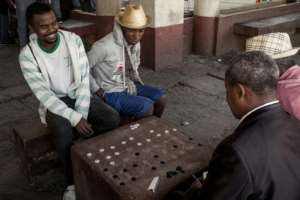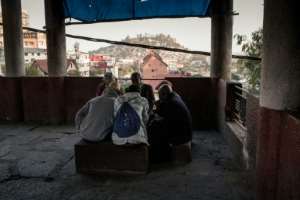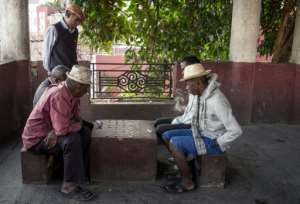
A stone's throw from the presidential palace in Madagascar's capital Antananarivo, men sit for hours playing fanorona -- a cross between chequers and chess -- on wooden boards with black and white pieces.
"If you're not up to it, just say so, you're just slipping up and trying to bluster your way through," teased Raymond "General" Rasaminarivo, a renowned fanorona master, in the verbal jousting that typically accompanies the game.
Centuries after fanorona first appeared on the Indian Ocean island nation, it still exerts its grip on players of all ages and from all walks of life.
Men hunch over their "lakapanorona" boards in concentration, while children use playing surfaces traced into the dirt of their schoolyards, grappling with the game's nearly infinite moves.
The goal of the two-player game is to remove or block the opponent's pieces by moving one's counters towards -- called "approach moves" -- or away from the rival's counters -- "withdrawals".
All of the opponent's pieces left in an uninterrupted line are then removed from the board, bringing the player a step closer to victory.
With eyes fixed on the next move, Rasaminarivo's rival Raphael battles to get the upper hand against "the General" -- but the ensuing defeat so embarrasses Raphael that he refused to share his surname.
'Avoid the traps'
"This game demands concentration to identify the routes to victory and caution to avoid the traps," Raphael says.
 Fanorona is an extended version of Western draughts or Go, popular in the Far East, using a rectangular board marked with lines and intersections in which each player starts with 22 pieces. By RIJASOLO (AFP)
Fanorona is an extended version of Western draughts or Go, popular in the Far East, using a rectangular board marked with lines and intersections in which each player starts with 22 pieces. By RIJASOLO (AFP) The General uses insults and snide remarks to try to throw off his opponent but Raphael tries to not take offence.
"The opponent's provocation just adds a little spice to the game," he says with a smile.
Fanorona is an extended version of Western draughts or Go, popular in the Far East, using a rectangular board marked with lines and intersections in which each player starts with 22 pieces.
The aim is to take the opponent's pieces by moving backwards or forwards along the lines of the game board -- before entirely encircling the other player's counters.
"A single piece can land multiple blows, and a single blow can remove between one and seven of the opponent's pieces," says Lantohariseta Andriamampianona, technical director of the revered fanorona association.
"A player can also decline to eject their adversary's pieces to avoid falling into traps."
Another quirk of the game is that the winner goes into a second round of play, known as the vela, with a handicap.
There are multiple theories about how the game came to enchant the island.
Some believe that fanorona was the brainchild of Indonesian settlers.
 There are several theories about how fanorona came to Madagascar, including that it was born in the Malagasy royal court as a strategic tool to help military leaders plan tactics. By RIJASOLO (AFP)
There are several theories about how fanorona came to Madagascar, including that it was born in the Malagasy royal court as a strategic tool to help military leaders plan tactics. By RIJASOLO (AFP) Others swear that the game traces its roots to the 17th century and the first Arab traders to reach Madagascar's shores.
But some insist that the game was born in the Malagasy royal court as a strategic tool to help military leaders plan tactics.
'Make the game global'
For 27 years, researcher Eris Rabedaoro has been looking into the secrets of fanorona.
"I realised that it was a perfect diagram of the universe where we see all the basic laws of physics, mathematics or psychology," he says.
Rabedaoro even likens taking an opponent's pieces to nuclear fission.
 An electronic version of fanorona for mobile phones was launched four years ago and its developers hope to make the game global. By RIJASOLO (AFP)
An electronic version of fanorona for mobile phones was launched four years ago and its developers hope to make the game global. By RIJASOLO (AFP) Raphael and "General" Rasaminarivo have a simpler take on the game -- seeing it as a means to "sharpen our minds".
"Fanorona teaches you to anticipate and persevere," says another player, Andrianasolo Mamy Riana. "It gives you the power to tackle life, it gives you courage."
The fanorona association's Andriamampianona notes: "In ancient times, fanorona was the preserve of kings and their courts... Today it really has become a game of the people."
Such is the game's widespread appeal that an electronic version for mobile phones was launched four years ago -- one of the first video games developed entirely on the island.
The free app has been downloaded 30,000 times, according to its developer Mendrika Andriantsihoarana.
"A download in Argentina, one in China, two in France, two in Germany, three in the United States -- it was a pleasant surprise," he said.
"I think we're nearing the goal we set ourselves when we launched 'e-fanorona' -- to make the game global."
Read Full Story



















Facebook
Twitter
Pinterest
Instagram
Google+
YouTube
LinkedIn
RSS